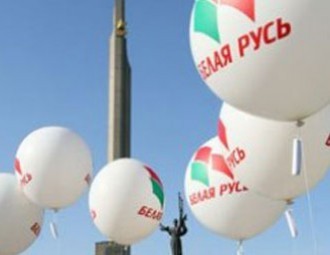Ulad Vialichka: “Belaya Rus” speculates about the term “civil society”

The leader of the public organization Aliaksandr Radzkou stated that it is his organization that is involved in consolidation of Belarusan civil society; but representatives of civil society disagree.
On November 15 an enlarged meeting of the national public organization “Belaya Rus” took place in Minsk, where it was announced that the organization is an active supporter of Aliaksandr Lukashenka and is ready to do everything that is needed for his reelection next year.
Ulad Vialichka, the head of the International Consortium “EuroBelarus”, gave the interview to “EuroBelarus” Information Service and told whether “Belaya Rus” represents the interests of the civil society or not.
- The leader of “Belaya Rus” Aliaksandr Radzkou was talking about work that the organization does for the Belarusan civil society. How can we assess such statements?
- The term “civil society” has nothing to do with “Belaya Rus”. Civil society is an independent institute of society that consists of citizens who openly express their opinions.
Radzkou might be speculating about the terms to demonstrate international partners the knowledge of language and send some signals. For people who have been living in a civil society for many years this statement looks like imposture.
- There are about one hundred fifty thousand members in “Belaya Rus”. How influential is this organization, what kind of influence is that?
- Of course, the organization with such number of members cannot but be influential, and those who established it might have certain goals and plans about using this structure.
But in this case I see no connection between the goals and a civil society. “Belaya Rus” is an organization in the state’s infrastructure that performs some kind of service, where citizens are recipients of influence.
The organization has long-term purposes such as to satisfy the interests of the state; but it has little to do with the civil society.
- Top officials are among the leaders of the organization. Is it a normal situation?
- There is nothing blameworthy in it. Any citizen including top officials has a right to be a part of civic procedures. But I think that in this case officials have to continue their governmental work instead of turning into public figures.
A citizen acting in the civil society is acting as a citizen regardless of his employment; he or she is realizing his or hers civil purposes and values. And “Belaya Rus” is basically an institute filled by the power vertical.
Having the resources for contacts with people and authorities, “Belaya Rus” might well be influential; but it doesn’t mean that they are beneficial.
- “Belaya Rus” has adopted a plan for the election campaign of 2015 during which the acting head of state Aliaksandr Lukashenka is to be supported. Is it a proper thing to do for the public organization?
- I believe such goals can correspond to the goals of public organizations if political and civic life is included in their agenda.
Another thing is that we understand what kind of situation we are in. If “Belaya Rus” takes part in promotion of Lukashenka’s campaign, then other organizations will be punished for doing similar things in the interests of other political actors, which is wrong.
It is not even a matter of right; it is a matter of equality of these political opportunities. Unfortunately, there is no such equality in Belarus.
- What do you think will become with “Belaya Rus” when the regime changes?
- I think that no matter what the future political life in Belarus will look like, such pro-governmental initiatives will always appear. This is normal. But in Belarus they appear with prejudice to the interests of other groups, which is unacceptable.
The fact that someone finds Lukashenka’s policy correct and is ready to promote it has a right to do so, as well as any citizen, who is willing to support democrats, liberals, the green, and so on. The main thing is not to the right to support somebody or act against somebody, but equally realize our rights in our own country.
-
03.01
-
07.10
-
22.09
-
17.08
-
12.08
-
30.09



























